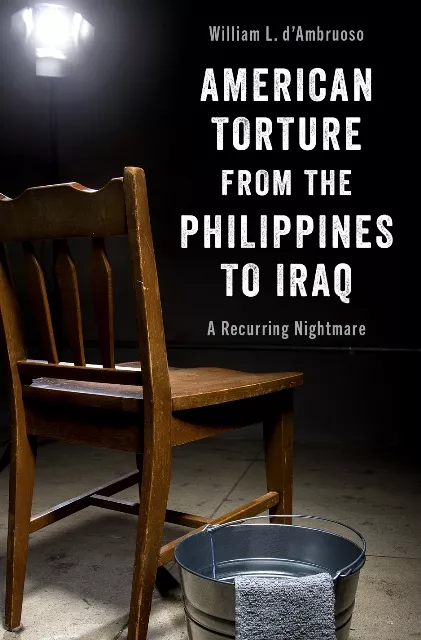Featured in the Fall 2021 Newsletter »
Overview
What explains the United States' persistent use of torture over the past hundred-plus years? Not only is torture incompatible with liberal values; it is also risky and frequently ineffective as an interrogation method.
In American Torture from the Philippines to Iraq, William L. d'Ambruoso argues that the norm against torture has two features that help explain why liberal democracies like the United States have continued to violate it. First, the norm against torture paradoxically contributes to the belief that torture works. In naming certain behaviors as appropriate, norms also define what is inappropriate. Some policymakers and soldiers believe (not always unreasonably) that in the nasty world of international politics, cheaters—those who are willing to break the rules—have an advantage, especially in security matters. "Bad" becomes "good" because it appears effective, and rule-following is perceived as naïve and dangerous. Second, the anti-torture norm is not sufficiently specified to draw a definitive line between norm-compliant behavior and violations. For example, it is impossible to specify exactly how many hours must pass before forced standing becomes torture. As a result of torture's blurry definition, perpetrators can justify their actions by suggesting that the adversary is guilty of worse behavior, by using euphemisms such as "enhanced interrogation," or by flatly denying that an act is torture. In short, lack of specificity leads to justifications and redefinitions, which in turn enable transgressions. Drawing on previously overlooked archival testimony from the Philippine-American War (1899–1902), the Vietnam War, and the post-2001 war on terror, d'Ambruoso shows that the rationale for using torture has remained remarkably consistent throughout the past century.

Praise for American Torture
"If torture is so ineffective as an interrogation tool, producing unreliable information while spurring opposition recruitment and losing hearts and minds, why does it persist in liberal democracies that have clearly outlawed it? In this historically rich book, William d'Ambruoso addresses this paradox by examining the US government's use of torture over a century—from the Philippine-American War through the Vietnam conflict to the post-September 11 'war on terror.' He incisively shows how the allure of the prohibited (if it's banned, it must work, right?) and the vagueness of the prohibition (what exactly is torture, anyway?) contribute to a stubborn willingness in extraordinary circumstances to deploy a horrendous tool that its architects must know is both counterproductive and antithetical to the values that they purport to uphold." — Kenneth Roth, Executive Director, Human Rights Watch
"d'Ambruoso's work provides a historically rich account of the USA's use of torture from the late 1800s to the war on terror. He demonstrates the fragility of the anti-torture norm and provides a compelling argument for unequivocal definitions of torture, to help buttress the norm, and to facilitate accountability of elected officials who are responsible for upholding international human rights law, as well as the most fundamental of human rights." — Ruth Blakeley, University of Sheffield
"A concise, engaging volume that will be a must-read for scholars of armed conflict. Tracing US reliance on torture from war in the Philippines, to Vietnam, to the contemporary war on terror, d'Ambruoso achieves a remarkable feat: a crisply stated theoretical argument that nevertheless rejects false parsimony. Examining key decision moments across three conflicts, he explains the puzzling persistence of an atrocity that both courts international opprobrium and (often) fails to achieve its ostensible goals. The conflicts d'Ambruoso foregrounds are well known, yet d'Ambruoso brings new perspectives to the comparison—a significant feat." — Amelia Hoover Green, Drexel University
d'Ambruoso, William L. American Torture from the Philippines to Iraq. New York: Oxford University Press, Forthcoming.



